Philip Roth has long been a favorite author of many. His words have found themselves adapted for the big screen countless times and all to great effect. But it’s his 29th novel, INDIGNATION, that is one of the most beautiful and resonant adaptations thanks to writer/director James Schamus.
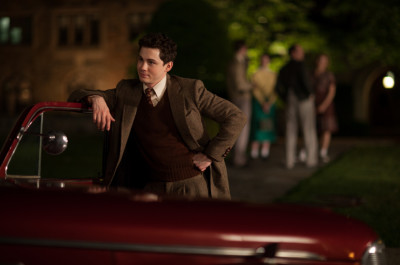
A novel that fictionalizes Roth’s own life during his college years, on both page and screen, we are transported on an emotional and sensory level to 1950’s Newark, New Jersey with the story of Marcus Messner. Jewish, and more than a bit neurotic, Marcus works in his father’s butcher shop while both his parents fret about the toll the Korean War is taking on their community. Day after day, another family loses a son, making Esther and Max Messner even more anxious and protective of Marcus.
Feeling stifled at home, Marcus wants out and looks to college as his answer. But a small, Christian, liberal arts college in Ohio may not be the answer to his prayers as once he arrives, there is an even higher level of control being exerted on him than that of his parents, control from no less than the college dean, Dean Caudwell.
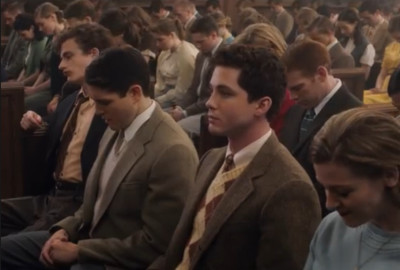
From haughty high–brow roommates to a first love with Olivia Hutton, a blonde shiksa princess fresh out of a mental hospital after attempted suicide, to his own brush with death (thanks to a burst appendix), Schamus takes us inside Marcus’ world. We feel his stress, his internal conflicts, his defiance to authority and his desire for independence yet uncertainty of how to achieve it. The emotional connection with the audience is seamless.
Logan Lerman in a tour-de-force performance amazes with an intensity and rhythmic vocal and emotional cadence that is riveting. He has a maturity and confidence not seen from him prior. Not having read this particular novel by Roth, I can’t speak to the adaptation as a whole, however, it is an intriguing study of character and society in the 1950’s, focusing on the very erudite Marcus Messner, which in and of itself, elevates the level of storytelling to something more intellectual, probing and analytical.
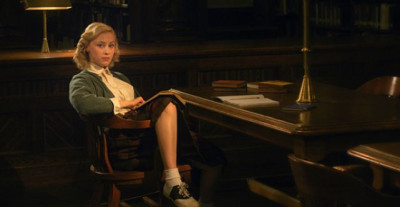
While character development is strong with Marcus, it is a bit less developed with Olivia, yet we know all we need to need to know once we learn of her mental frailties. As Olivia, Sarah Gadon shines with an ethereal fragility and softness that she turns on a dime with a look or pursing of the lips when dark self-questioning questions or statements are made.
Exceptional are Linda Emond and Danny Burstein as Marcus’ parents Esther and Max. Mom-son sit downs while Marcus is in the hospital and then thereafter are edge-of-your-seat, quaking in your boots moments with mom in command. Emond is so firm and fear-inducing AND guilt-inducing (“I’ve never asked you to do anything for me, have I?”), no son – let alone an only child – could defy mom. Burstein delivers a mentally unstable dad that is unsettling and effective, also serving as a parallel to what is unfolding with Olivia or what had unfolded in Olivia’s life before meeting Marcus. It also adds to Marcus’ inability to recognize similar instabilities in Olivia as in his father. Intriguingly written and edited as we vacillate between the two.
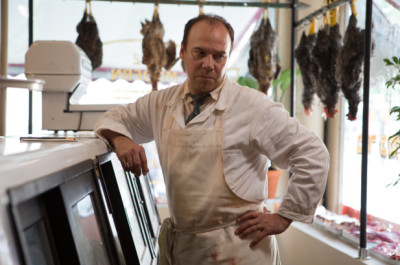
Ben Rosenfield is perfectly cast as Marcus’ roommate, the snotty, entitled brat Bertram. Probably his most memorable performance prior (had the film been marketed better more would know this) was “Affluenza” wherein he played a character similar to Bertram. Rosenfield pushes the envelope of obnoxious annoyance almost to the point of loathing. Pico Alexander delivers a great BMOC “despite being Jewish” performance as Sonny so that while he pretends concern, his voice and inflections belie sincerity. There’s always an angle. He’s got an “Eddie Haskell” vibe going on that works wonders.
Tracy Letts is simply killer as megalomaniac Dean Caudwell. Watching Letts and Lerman go toe-to-toe in a battle of wills and indignation on both sides of the desk is a masterful dance. I could watch the two of them go at it all day. Letts and Lerman, in the initial office confrontation with Lerman’s Marcus quoting Bertrand Russell, is the stuff from which Tony winning stage and Oscar-worthy performances are made. The entire structure of INDIGNATION is such that it is easy to envision it translated to the stage, but with Lerman and Letts reprising their roles. I reference the stage because the electricity is more palpable for this kind of one-upsmanship, hot tempered debate when experienced in person. However, that’s not to say you don’t still feel much of that on film.
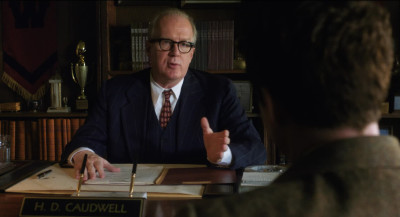
Former head of Focus Features and a man who produced films like “Brokeback Mountain”, “The Ice Storm”, “Sense and Sensibility” and who wrote “Lust, Caution” and “Crouching Tiger, Hidden Dragon”, James Schamus steps behind the camera marking INDIGNATION as his freshman feature directorial. His experience and keen storytelling ability belie him as a first time director.
Structured with visually and emotionally fascinating reverse design book-ending of an old woman mesmerized by wallpaper patterned with vases of red and white roses, and a flashback to an unseen soldier evading the Korean soldiers as the opening, and then an end reveal as to the identities of the woman and the soldier, voice-over narration giving us minimal exposition sets the stage for thought provoking questioning of self which then unfolds. Obviously condensing some key scenes of Roth’s novel (e.g., the confrontation between Caudwell and Marcus is 30 pages in the novel and some 15 minutes on screen), and eliminating superfluous characters and exposition, Schamus hones in on resonant authenticity and emotional truth, celebrating the devil in the smallest details.
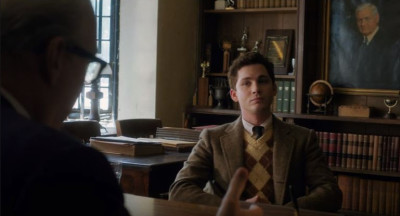
Fueling the dance between Marcus and life is rapier editing by Andrew Marcus and richly textured lensing by Christopher Blauvelt. Together, Marcus and Blauvelt draw us in to the time, the conflicting religious and social beliefs and the battle of wills between Marcus and his father, Marcus and Dean Caudwell and Marcus and himself. The tension created is palpable and exciting. Notably, Blauvelt’s lens hones in on its subjects with POV dutching, metaphorically tacitly reminding us who’s on top and who’s behind the eight ball at any given moment. The one person for whom we don’t see the high-low angles variations is with Sarah Gadon’s Olivia – the one individual who, while the known commodity of mental and emotional instability, runs on the most even keel while everyone else goes through the highs and lows and questions of life. Very nicely constructed by Schamus and Blauvelt.
Inbal Weinberg’s production design excels with period perfection. And take a look at the period vehicles. Similarly, Amy Roth’s costuming is not only period appropriate but culturally and socially defining. Just look at Esther’s shoes and the dark practical color and dowdy style of her clothes, Sonny’s jacket and trimmer hipster pants, the v-neck sweater vests and Olivia’s fashion magazine WASP apparel which is always light in color and texture as if she’s floating on air. The clothing tells us as much about each character as the story itself.
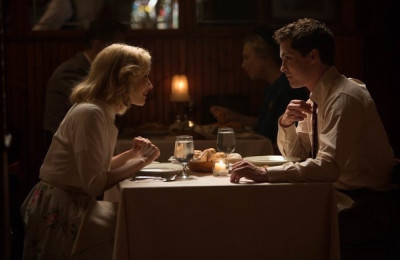
Completing the cinematic experience is Jay Wadley’s scoring and musical selections which are both rich and moving.
Schamus has left no stone unturned in this beauteous tapestry. And without revealing any spoilers, as with life, at the end of the day there are no real winners or losers. Everyone lives the hand they are dealt based on the decisions they make. But there is a poignant and touching realization for one who has memories of the one shining moment in life when they knew they were loved.
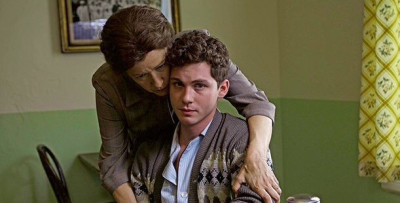
Written and Directed by James Schamus based on novel by Philip Roth
Cast: Logan Lerman, Sarah Gadon, Tracy Letts, Linda Emond, Danny Burstein












